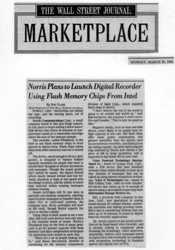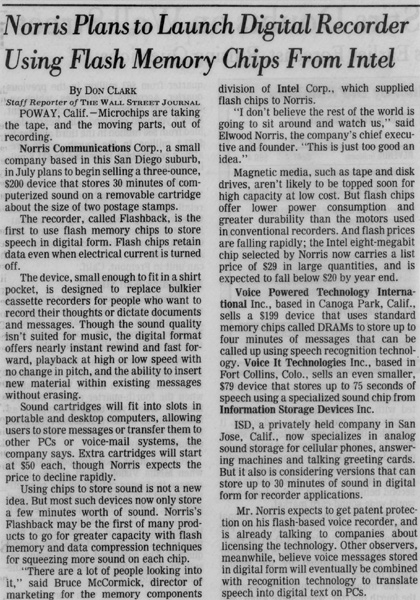
The Wall Street Journal
March 28, 1994
MARKETPLACE

Norris Plans to Launch Digital Recorder Using Flash Memory Chips From Intel
by Don Clark
Staff Reporter of THE WALL STREET JOURNAL
POWAY, Calif. - Microchips are taking the tape, and the moving parts, out of recording.
Norris Communications Corp., a small company based in this San Diego suburb, in July plans to begin selling a three-ounce, $200 device that stores 30 minutes of computerized sound on a removable cartridge about the size of two postage stamps.
The recorder, called Flashback, is the first to use flash memory chips to store speech in digital form. Flash Chips retain data even when electrical current is turned off.
The device, small enough to fit in a shirt pocket, is designed to replace bulkier cassette recorders for people who want to record their thoughts or dictate documents and messages. Though the sound quality isn't suited for music, the digital format offers nearly instant rewind and fast forward, playback at high or low speed with no change in pitch, and the ability to insert new material within existing messages without erasing.
Sound cartridges will fit into slots in portable and desktop computers, allowing users to store messages or transfer them to other PCs or voice-mail systems, the company says. Extra cartridges will start at $50 each, though Norris expects the price to decline rapidly.
Using chips to store sound is not a new idea. But most such devices now only store a few minutes worth of sound. Norris's Flashback may be the first of many products to go for greater capacity with flash memory and data compression techniques for squeezing more sound on each chip.
"There are a lot of people looking into it," said Bruce McCormick, director of marketing for the memory components division of Intel Corp., which supplied flash chips to Norris.
"I don't believe the rest of the world is going to sit around and watch us," said Elwood Norris, the company's chief executive and founder. "This is just too good an idea."
Magnetic media, such as tape and disk drives, aren't likely to be topped soon for high capacity at low cost. But flash chips offer lower power consumption and greater durability than the motors used in conventional recorders. And flash prices are falling rapidly; the Intel eight-megabit chip selected by Norris now carries a list price of $29 in large quantities, and is expected to fall below $20 by year end.
Mr. Norris expects to get patent protection on his flash-based voice recorder, and is already talking to companies about licensing the technology. Other observers, meanwhile, believe voice messages stored in digital form will eventually be combined with recognition technology to translate speech into digital text on PCs.

Contact Webmaster
Copyright © 2001-2005 Woody Norris. All rights
reserved.
Revised: September 29, 2005